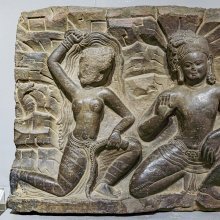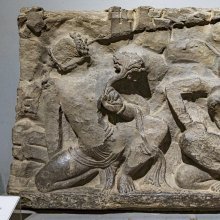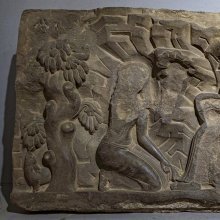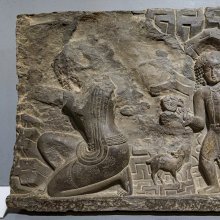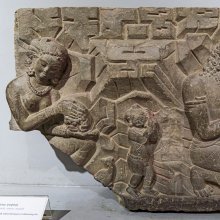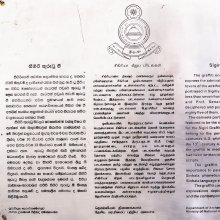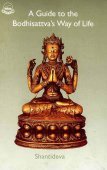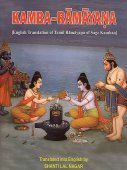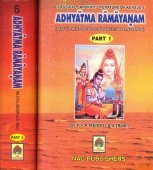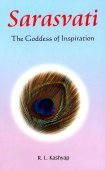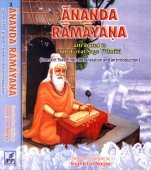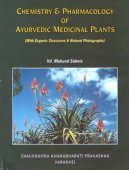Poetry, Poetic, Poetical: 3 definitions
Introduction:
Poetry means something in Hinduism, Sanskrit, the history of ancient India. If you want to know the exact meaning, history, etymology or English translation of this term then check out the descriptions on this page. Add your comment or reference to a book if you want to contribute to this summary article.
Images (photo gallery)
(+3 more images available)
In Hinduism
Purana and Itihasa (epic history)
Source: Shodhganga: Elements of Art and Architecture in the Trtiyakhanda of the VisnudharmottarapuranaPoetics refers to one of the topics dealt with in the Puranic literature: a category of ancient Sanskrit texts which gives a huge contribution in the development of Indian literature.—The Vishnudharmottara Purana contains different aspects of knowledge. Along with the narratives, this work bears immense information in various fields of study. [...] The third khanda contains 118 chapters which are dedicated to various contents such as Sanskrit and Prakrit Grammar, Lexicology, Metrics, Poetics, Dance, Drama, Music, Painting, Iconography, Architecture etc.

The Purana (पुराण, purāṇas) refers to Sanskrit literature preserving ancient India’s vast cultural history, including historical legends, religious ceremonies, various arts and sciences. The eighteen mahapuranas total over 400,000 shlokas (metrical couplets) and date to at least several centuries BCE.
Yoga (school of philosophy)
Source: ORA: Amanaska (king of all yogas): A Critical Edition and Annotated Translation by Jason BirchPoetry is denoted by the Sanskrit term Kavita, according to the Amanaska Yoga treatise dealing with meditation, absorption, yogic powers and liberation.—Accordingly, as Īśvara says to Vāmadeva: “[...] Not by studying the doctrines of scriptural exegesis, logic, planets and mathematics, nor by the Vedas, Upaniṣads, Dharmaśāstras [and the like]; not even by lexicons nor metre, grammar, poetry (kavita) nor rhetoric; the sage's attainment of the highest reality is gained only from the oral teachings of his own Guru. [...]”.

Yoga is originally considered a branch of Hindu philosophy (astika), but both ancient and modern Yoga combine the physical, mental and spiritual. Yoga teaches various physical techniques also known as āsanas (postures), used for various purposes (eg., meditation, contemplation, relaxation).
India history and geography
Source: archive.org: Rajatarangini (Ranjit Sitaram Pandit) (history)Poetry refers to the “speech the soul”.—Well-known Kashmiri rhetoricians like Mammata, the author of the Kavya-Prakasa, had said that one of the purposes of Kavya or Poetry was to teach the art of life (Vyavahara-vide). Kavya or Poetry was defined as “speech the soul of which is Rasa”. There were in all eight Rasas or sentiments; Shringara (love), Hasya (merriment), Karuna (pathos), Raudra (wrath), Vira (martial), Bhayanaka (terror), Bibhatsa (repulsion), Adbhuta (marvel), which were the essence of poetry.

The history of India traces the identification of countries, villages, towns and other regions of India, as well as mythology, zoology, royal dynasties, rulers, tribes, local festivities and traditions and regional languages. Ancient India enjoyed religious freedom and encourages the path of Dharma, a concept common to Buddhism, Hinduism, and Jainism.
See also (Relevant definitions)
Full-text (+3768): Kavya, Kavita, Dhvani, Kavitva, Chandas, Adbhutarasa, Rupaka, Shringara, Shirakamala, Rasaprabandha, Kabya, Kavyarasika, Kavitvakarani, Sayara, Chatraganda, Avatanka, Dhvanita, Kavyalankara, Uddiyakavi, Kavyabandha.
Relevant text
Search found 236 books and stories containing Poetry, Poetic, Poetical; (plurals include: Poetries, Poetics, Poeticals). You can also click to the full overview containing English textual excerpts. Below are direct links for the most relevant articles:
Kavyamimamsa of Rajasekhara (Study) (by Debabrata Barai)
Introduction to Kāvyaśāstra and Alaṃkāraśāstra < [Chapter 3 - Contribution of Rājaśekhara to Sanskrit Poetics]
Part 1 - The origin of Indian poetics < [Chapter 1 - Introduction]
Part 3.3a - Nature of Pratibhā (poetic genious) < [Chapter 5 - Analyasis and Interpretations of the Kāvyamīmāṃsā]
Kuntaka’s evaluation of Sanskrit literature (by Nikitha. M)
3.1. Purpose of poetry according to Kuntaka < [Chapter 1 - Vakroktijīvita: A Synoptic Survey]
Origin and development of Sanskrit poetics < [Introduction]
Review of literature < [Introduction]
Alamkaras mentioned by Vamana (by Pratim Bhattacharya)
26: Alaṃkāra-śāstra according to Jagannātha (17th Century) < [Chapter 2 - The concept of alaṃkāra in Sanskrit Poetics]
14: Alaṃkāra-śāstra according to Mammaṭa (11th century) < [Chapter 2 - The concept of alaṃkāra in Sanskrit Poetics]
Vakyapadiya (study of the concept of Sentence) (by Sarath P. Nath)
3. The Concept of Pratibhā in Indian Poetics < [Chapter 4 - The Concept of Pratibhā and its Implications]
2. The Concept of Pratibhā in Indian Philosophy < [Chapter 4 - The Concept of Pratibhā and its Implications]
5.2. Various Means of Ascertainment of Meaning < [Chapter 3 - The Concept of Sentence and Sentence-Meaning]
Sahitya-kaumudi by Baladeva Vidyabhushana (by Gaurapada Dāsa)
Introduction < [Introduction]
Paṇḍita-rāja Jagannātha < [Introduction]
Text 8.14 < [Chapter 8 - Literary Qualities]
Form and Essence in Poetry < [December 1939]
Thought in Poetry < [October 1952]
Objective Correlative as Technique of Suggestion < [October – December, 1978]
Related products
(+6 more products available)
